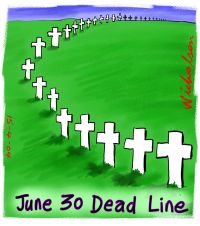
Regardless of whether Obama or McCain won last year’s US presidential elections, today’s event would have taken place either way. Today, Iraq is celebrating “National Sovereignty Day.” The date for today’s US combat troop withdrawal from all Iraqi cities, towns and villages was agreed upon by the Bush administration and the Iraqi government headed by Prime Minister Nuri al-Maliki, who was overly eager to see US combat troops leave (and take credit for it).
The Iraqi government is seeking to gain political capital by portraying itself as being the one that ordered the US occupiers out of Iraqi streets and towns. Yet as the New York Times reports, many Iraqis on the streets of Baghdad are less enthusiastic about what is to come, citing the fear of rising violence between Sunni and Shia extremists. “Far from a celebration, the deadline has provoked uncertainty and even dread among average Iraqis, underscoring the potential problems that Mr. Maliki could face if bloodshed intensifies.” Also CNN quotes Iraqi civilians expressing fears of a surge in violence and the lack of protection from the Shia-dominated Iraqi security forces.
Former US Vice-President Dick Cheney has voiced fears that the Iraqi government may not be strong enough to stand on its own without the support of active US combat troops.
A more differentiated look at the troop withdrawal comes from Michael Knights of the Washington Institute for Near East Policy. As Knights explains, moving troops out of densely populated cities is one thing, removing them from rural areas and the borders is a different story: “Although urban counterinsurgency is difficult, the dense population of cities quickly becomes an asset once the population has turned against the insurgency. Rural counterinsurgency is slower: the population is sparse and susceptible to intimidation, and the maintenance of a permanent security force presence across large areas of rugged terrain is difficult. In such areas — for example, along the Iranian and Syrian borders and in rural Diyala, Anbar, and Maysan — U.S. forces will likely be a full operational partner to the Iraqi military beyond August 2010 and possibly into 2011. ”
Iraq war skeptic Fareed Zakaria, writing in Newsweek early this month, sounded cautiously optimistic regarding Iraq‘s progress. In fact, the article has earned him some criticism in the blogosphere that he was suddenly painting too rosy a picture of the situation. Zakaria states:
“There is much going on in Iraq that is admirable. Kurds, Shiites and Sunnis are beginning to work out their differences through negotiation, not violence. Freedom of speech abounds. A new economy is taking shape, in which entrepreneurs are creating jobs and a civil society. Elections are punishing thugs and theocrats who cannot deliver services and rewarding more-pragmatic forces. The appeal of radical Islam is waning.” Yet Zakaria also warns that these successes are fragile and could be reversed if US support troops are not actively involved in stabilizing Iraq.
A gloomy prognosis is offered by Stephen Biddle in his report “Reversal in Iraq” published by the Council on Foreign Relations. It urges the US military to slow down its withdrawal to prevent a reversal of the successes achieved by the surge.
All in all, the Iraq pundits today seem rather lost, unsure what the future will hold. Yet one thing is clear: Today’s troop withdrawal is the former Bush administration’s final act in its unpopular war of choice. From now on, Iraq will be Obama’s war. Whether Iraq will descend into civil war or continue on a route to peace and progress will now become part of Obama’s foreign policy legacy.
Cartoon: Peter Nicholson


One reply on “Iraq Has Just Become Obama’s War”
This war is the second expensive for U.S. after the World War II. Here I’ve tried to summarize all costs of the Iraq war for Americans:
http://www.myhowtoos.com/en/red-hot/86-all-costs-of-war-in-iraq-for-usa